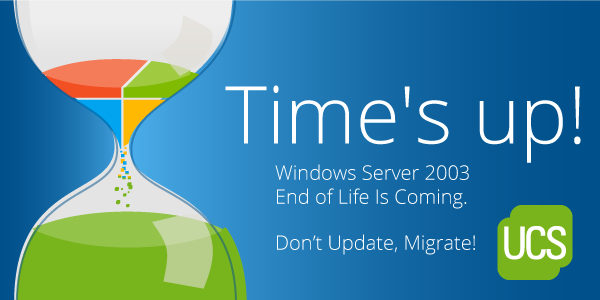
For almost a dozen years, Microsoft Windows Server 2003 has been the predominant enterprise server solution and platform for Active Directory, Exchange and many third party solutions. On July 14, 2015, this era will come to an end when Microsoft stops providing support for the product, leaving many businesses to find a successor to their current operating system. While migrating from Windows Server 2003 to Windows Server 2012 is an option, why not make an informed decision to embrace openness with Univention Corporate Server (UCS)?
The first thing that comes to the mind when choosing a new next server operating system is the development speed of current technologies. Back in 2003, Smartphones were unknown, clouds could only be found in the sky and tablets were exotic devices entering the laptop market. Today, however, there is no longer one operating system with one feature set that’s good to go for the next 11 years.
Update Cycles at Univention
Think these developments are only taking place in the consumer market and only peripherally touching the business base? Just tell your CEO that your software doesn’t support his new iPhone and you might think again. At Univention, updates to new versions of UCS are driven mostly by the admins who spend time updating the server but need user-facing software to support a new end device. Of course we also have updates in UCS, but in contrast to installing a new operating system and migrating data between old and new servers, which is what you get with Microsoft Servers, these updates consist mostly of pushing a button in the management console and the server takes care of the rest. This shortens considerably the time needed for an update, especially when using UCS’s built-in or third party virtualization solutions to facilitate testing your environment before major updates.
UCS as a platform for business IT
Of course the server platform and the management directory are but the basis for a working IT infrastructure. In many cases, groupware solutions, CRM systems and many more of your IT solutions need to be connected to the domain controllers. For most of these, UCS offers many choices that are easy to install and use. Backup and groupware solutions are available with one click in the Univention App Center, and you can get the enterprise software that fits your business needs, often for a fraction of the costs associated with the corresponding Windows Server-based solution. Even better, these solutions are integrated into one consistent management interface, dramatically reducing the learning curve.
Migration of Microsoft domains
Well you might now say, “Yes, there may be better flexibility and choices with the Server Applications and the Univention Management Console is considerably more user-friendly than our current system, but I don’t want to reenter all the data, and even worse, touch all the workstations to get them into a new domain. I have to do neither when using a Microsoft Product.” Again, we anticipated concerns like this and make it extremely easy to migrate your data and workstations so you can focus on the server-based services that need to find a new home.
These critical points illustrated by UCS, underscore the importance of considering flexibility, ease of use and most of all, choice and openness when selecting your next-generation server operating solution. This way, you can assure that the administration of your IT infrastructure is the experience you want it to be. Univention, along with our partners, believe that UCS is the platform for the next dozen years and beyond.